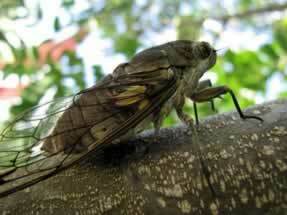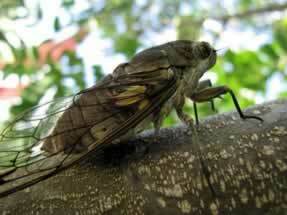Cicadas are insects that belong to the order Homoptera and the family Cicadidae. These insects have a long period of transformation that we call metamorphosis. Metamorphosis in insects is common, and cicadas are the only insects that produce the loud, shrill sound we know.
Adult cicada females are fertilized by the male during the period of intense agitation, which is when the males sing the most. Once fertilized, females lay their eggs on vegetable branches and leaves, and die soon after. When cicada eggs hatch, nymphs (young insects) come out and descend from the plant and burrow into the ground, feeding on the sap of the roots.

Some cicada species can stay up to 17 years buried underground
Depending on the species of cicada, the phase in which it is buried in the ground can last from four to seventeen years. After passing through this period it leaves the ground and climbs the trees. Once in the trees, the cicada undergoes a transformation, becoming an adult and showing itself ready for mating.
In Brazil, in the springtime, cicadas are in intense agitation, and males that have a stridulatory apparatus in their abdomen emit sounds to attract females. Each species of cicada has a different song, with the larger ones making more noise, especially on hotter days.

The sound that cicadas produce serves to attract the female and to keep predators away
The noise made by cicadas is loud, so both males and females have a pair of membranes that act as ears, so that the shrill sound does not harm the insect.
Cicada males sing not only to attract females, but also to keep their predators at bay, especially birds. When singing, the loud and shrill sound of the cicadas hurts the birds' sensitive ears, in addition to interfering with the group's communication.

Cicadas have positive and negative importance in the ecosystem
Cicadas have positive and negative importance in the ecosystem. The positive importance is to serve as food for predators, and the negative is to be a pest for some cultures. When cicada nymphs are underground, they suck the sap of plants through the roots, causing wounds that serve as a gateway for disease-causing fungi and bacteria.
Paula Louredo
Graduated in Biology

